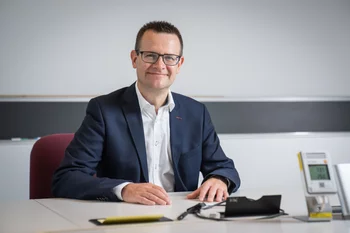Zero greenhouse gas emissions by 2050: Switzerland can only achieve this ambitious goal if science, business, politics and society all work together. The six institutions of the ETH Domain have pooled their expertise, with PSI as the Leading House, to form the Swiss Centre of Excellence on Net-Zero Emissions (SCENE), in order to support the country's decarbonisation.
2050 should be the end: The Federal Council has decided that by that date, Switzerland should stop emitting climate-harming greenhouse gases, such as CO2. Despite this clearly defined goal, many questions remain unanswered, such as: Which pathways lead to the net-zero goal? How can we achieve societal acceptance? And what technological developments and legal framework are needed for the economy to develop viable business models? It is clear, however, that stakeholders in science, business, politics and society all need to work together closely to make use of available synergies, in order to reduce emissions rapidly and radically across all areas of application. At the same time, technologies that generate negative emissions must continue to be developed, in order to offset residual emissions that are difficult to avoid.
This is where the Swiss Centre of Excellence on Net-Zero Emissions, or SCENE for short, comes in. It channels the expertise of more than 30 research laboratories in the field of net-zero emissions and provides a platform for interdisciplinary, cross-institutional collaboration in the ETH Domain. All institutions within the ETH Domain are involved in the joint initiative: PSI as the Leading House, Empa, WSL, Eawag, ETH Zurich and EPFL. "Transforming the energy system and society will take decades - but we need to act quickly now and set the right course," says Thomas J. Schmidt, head of the Energy and EnvironmentResearch Division at PSI and co-director of SCENE.
Dovetailing research to meet the climate goals
Research can support the various stakeholder groups on the path to net-zero, but this calls for a broad collaboration across a wide range of disciplines. Björn Niesen from Empa, co-director of the consortium, explains how SCENE can contribute: "For example, research is being performed on the use of biomass for energy, and at the same time., research is being carried out on the use of wood as a construction material - but, until now, these two areas have not been closely interlinked." In order to make better use of the potential offered by native forests, such thought silos need to be broken down, says Niesen: "We want to build bridges between the individual disciplines and areas of application." In the above example, this could be achieved through cascading the use of wood, first using it in the building sector and only afterwards using it for the production of electricity and heat.
Six strategic work packages for achieving net-zero
In order to achieve the goal of net-zero emissions, six top-priority action areas have been identified: the researchers want to investigate the contribution of carbon cycles involving biomass from wood; develop technical processes for capturing, using and storing carbon; and create guidelines for efficient and closed technical material cycles for infrastructure buildings. Other work packages include an energy system with low CO2 emissions and high social acceptance, cross-sector greenhouse gas and climate models, and net-zero pathways for the participating institutions.
An entire work package deals with communications surrounding the net-zero target and the technologies that can be used to achieve it. The partners want to raise awareness, especially among young people. They are the decision-makers of tomorrow and will have to live with the long-term consequences of climate change. Over the next three years, staff working on the project plan to visit at least 60 schools. Additionally, they plan to be in close communication with representatives from politics, public authorities, business and industry. "We want to contribute to a fact-based discussion and support stakeholder groups to make scientifically sound decisions," says Björn Niesen in summarising the main goal of this dialogue.
More than 17 million francs for three years
SCENE belongs to the strategic area, "Energy, Climate and Environmental Sustainability," which is one of the five strategic areas defined by the ETH Board for the period of 2025-2028. In response to the urgency of the issue, six Joint Initiatives in this strategic area have already started their work two years earlier in 2023. SCENE is working closely with the other Joint Initiatives, including the thematically related projects, "Speed2Zero" and "MainWood", which are led by ETH researchers. The ETH Board is funding half of the project, and the other half is covered by the six participating institutions - the total budget over the three-year project is 17.2 million Swiss francs. 2025 will not be the end, however. Thomas J. Schmidt: "We want to establish a new culture of collaboration between the individual disciplines and sectors that will reach far into the future."
Text: Bernd Müller








